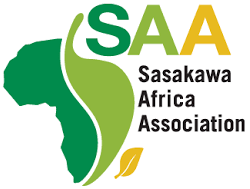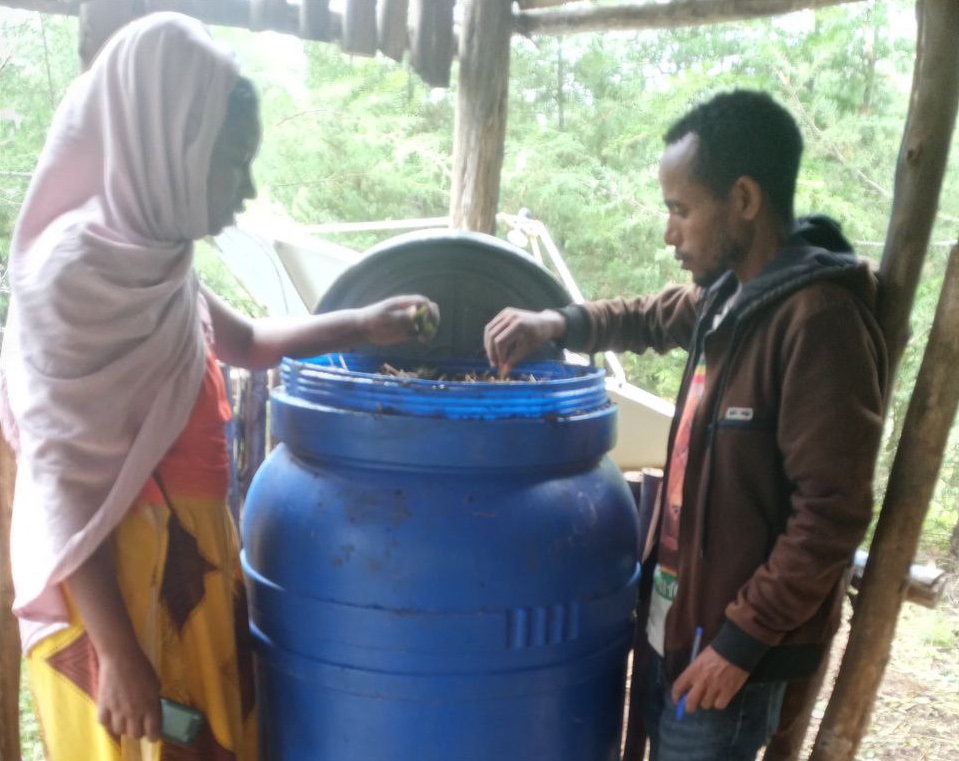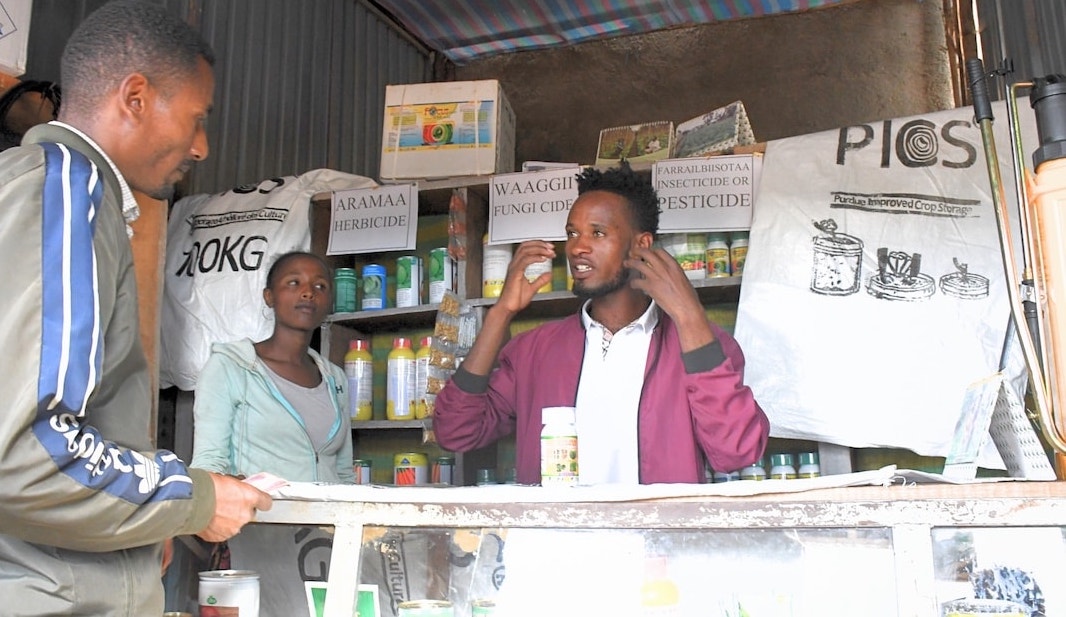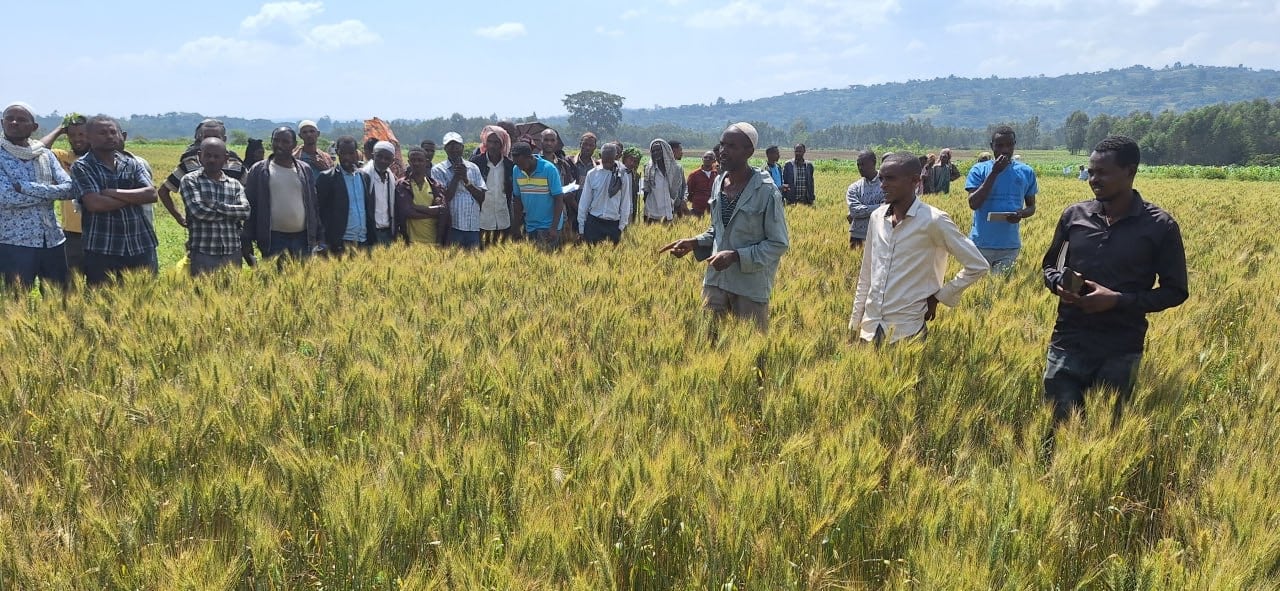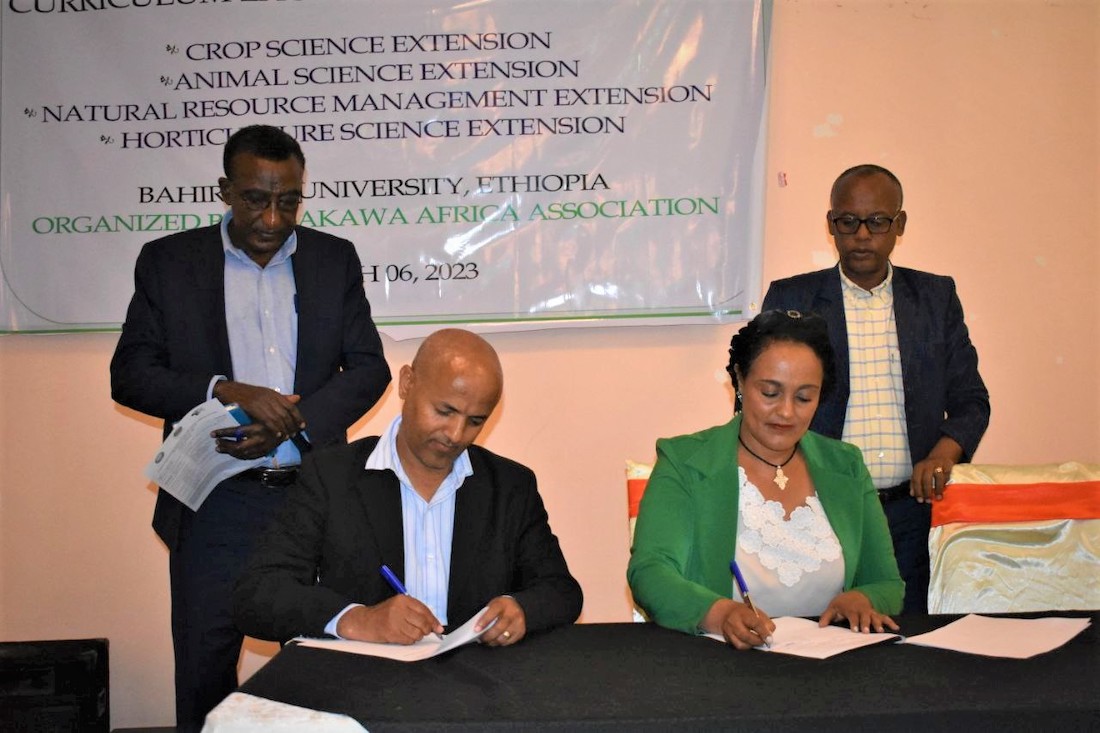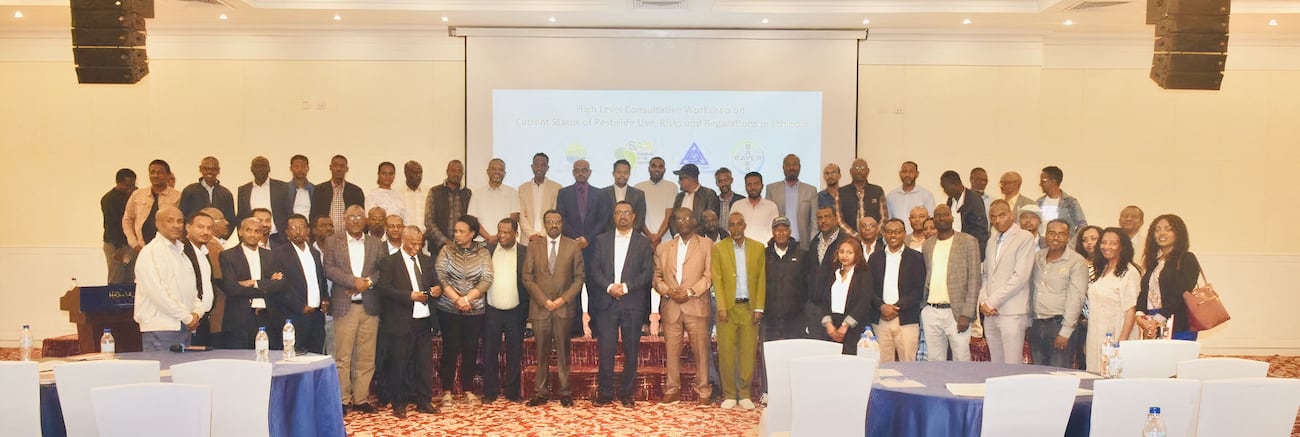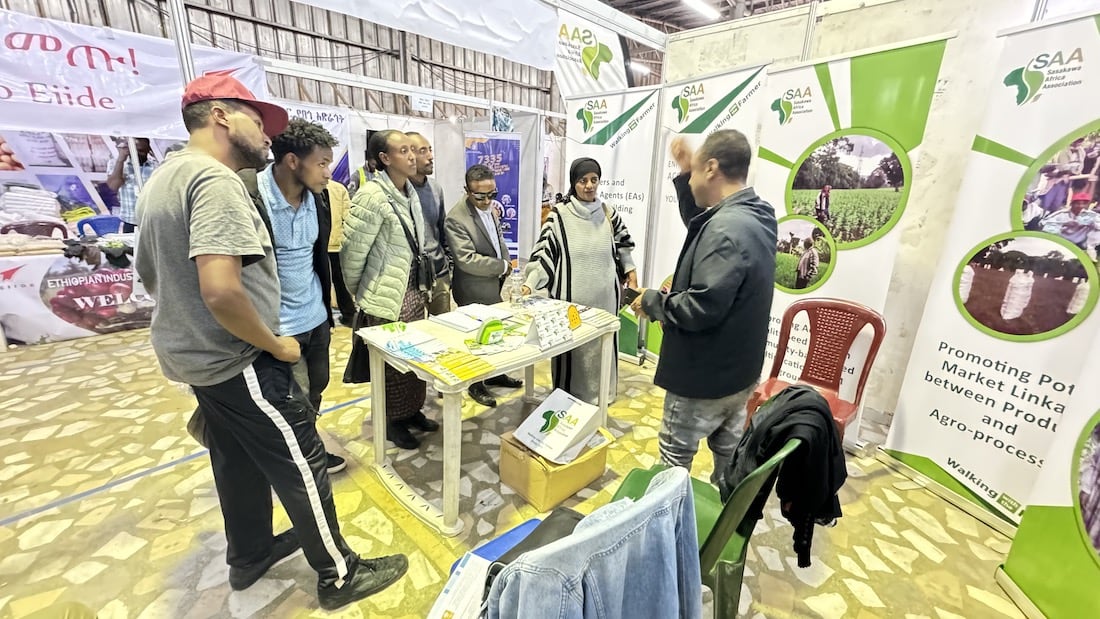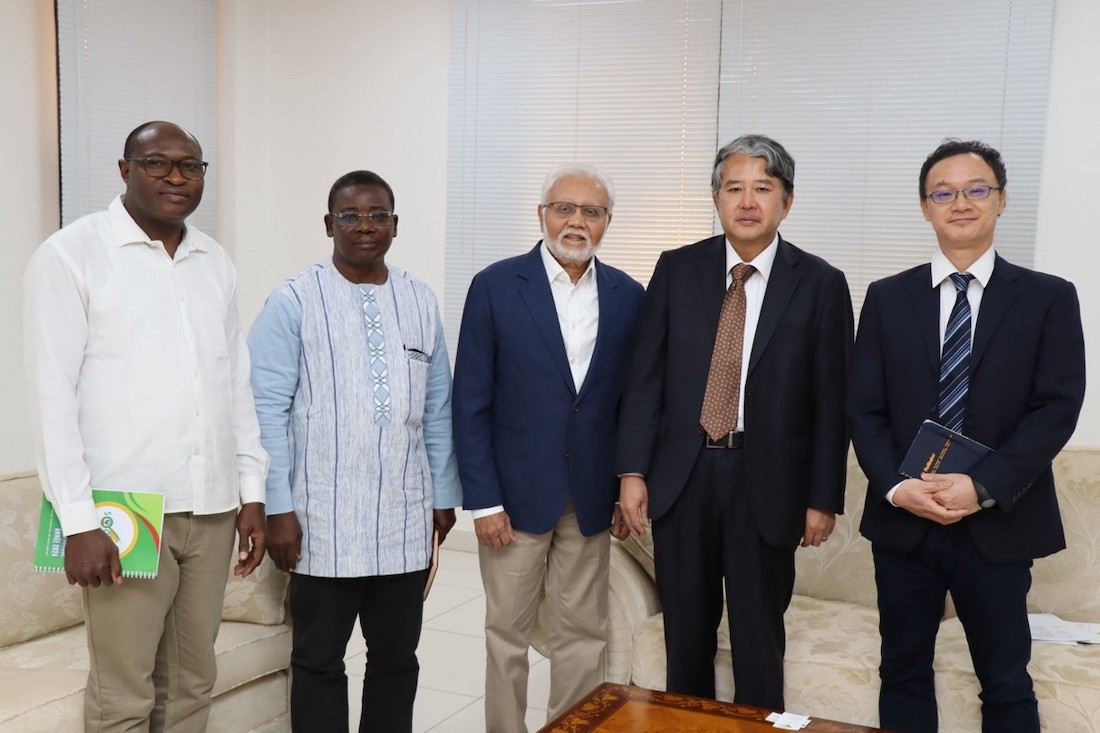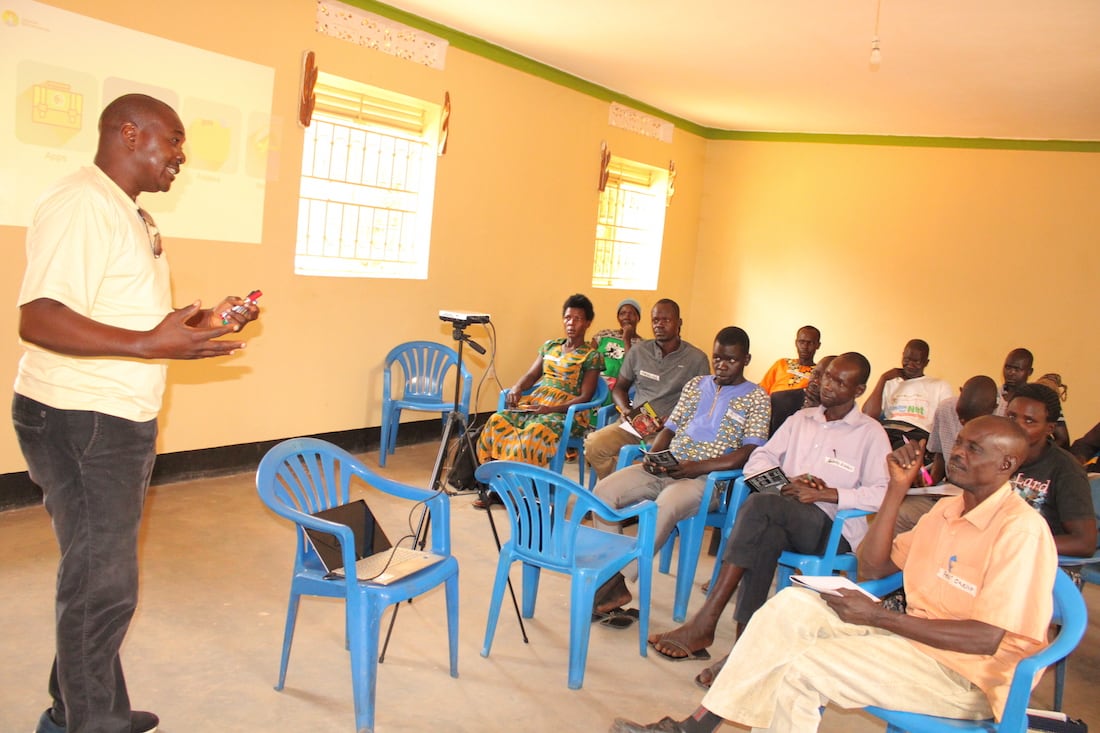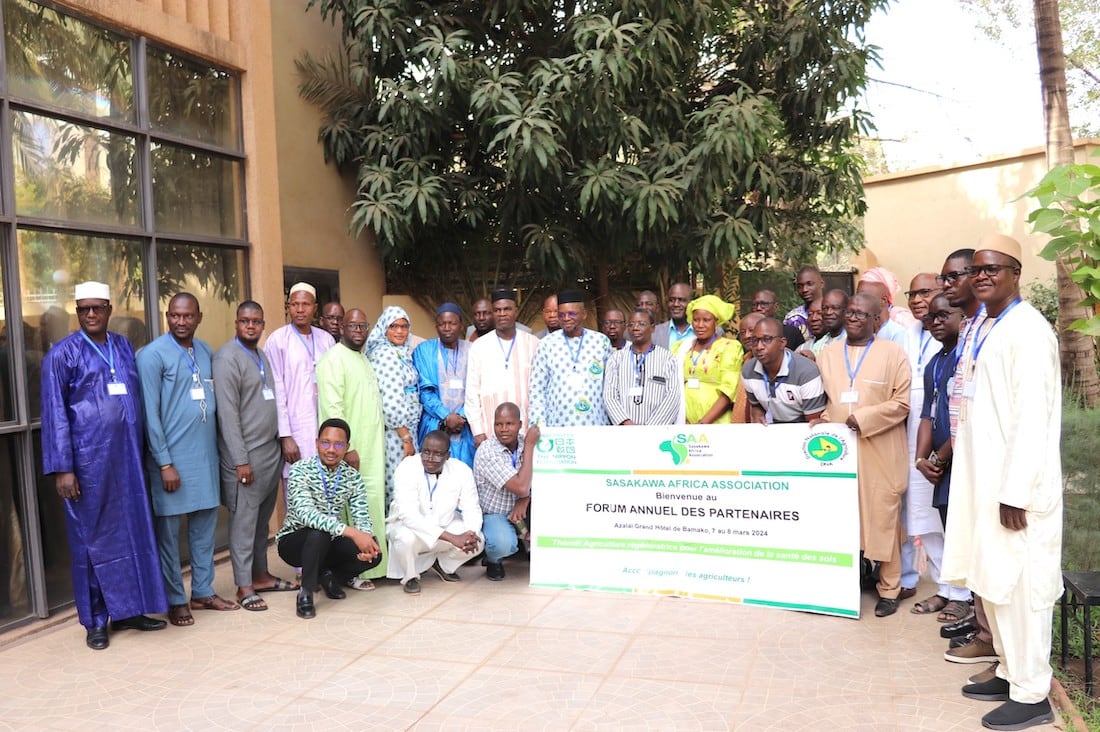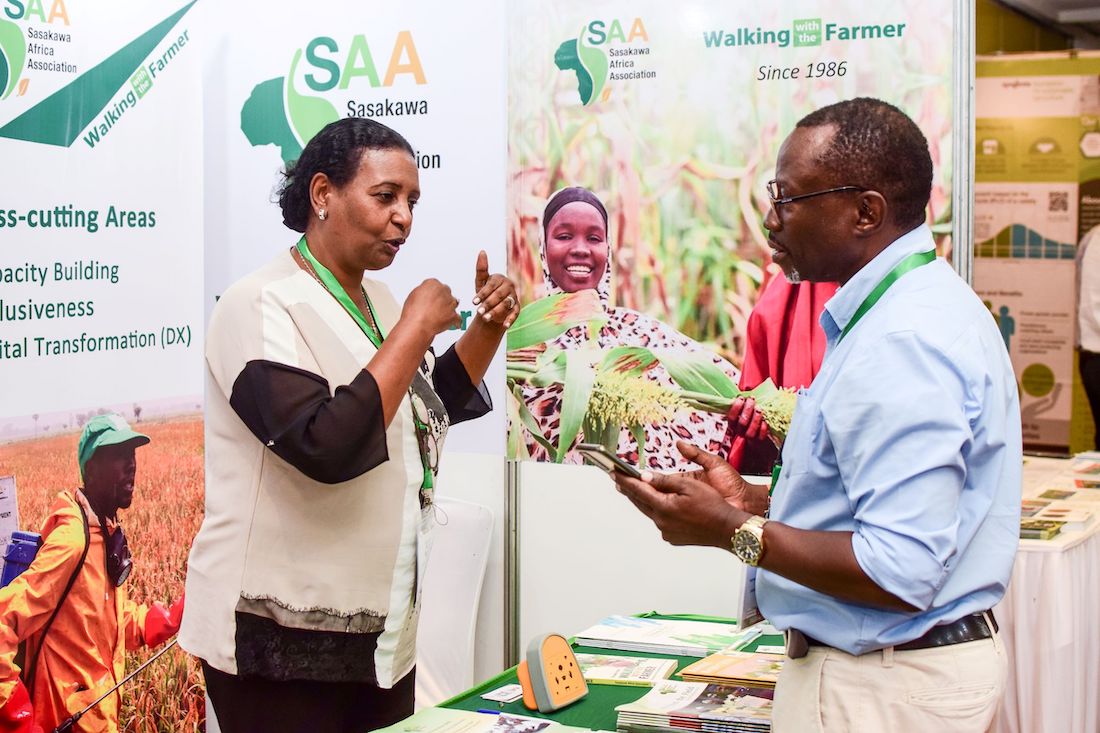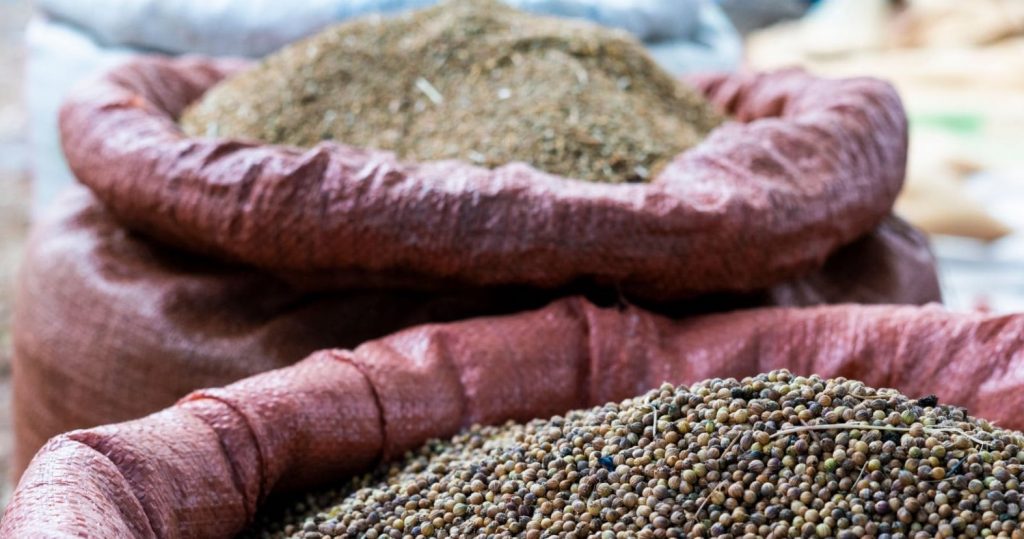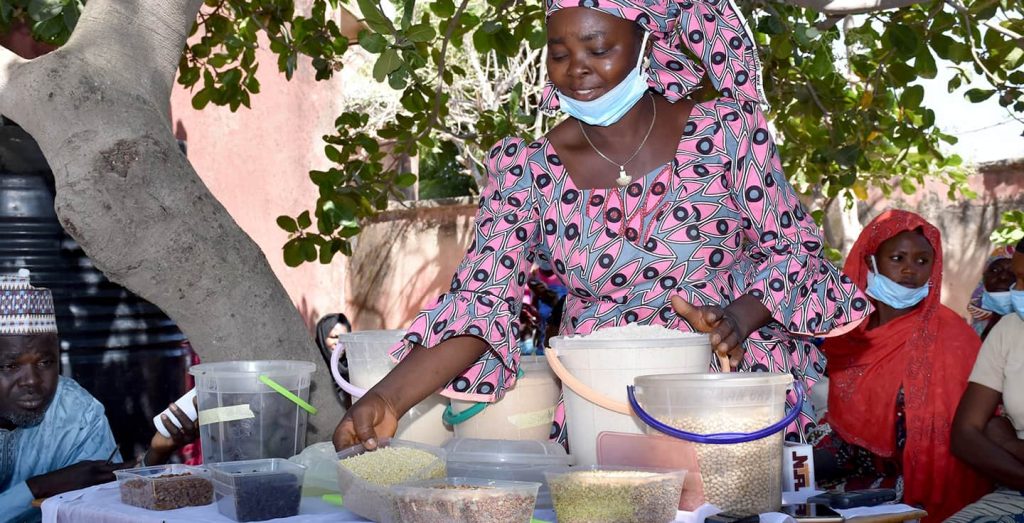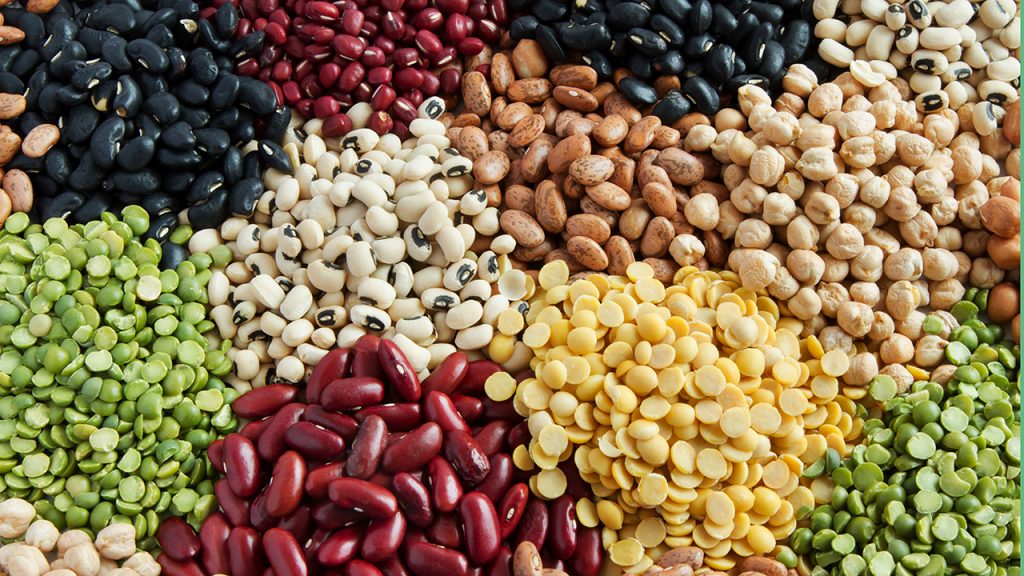Focus on Ethiopia
April 2024
A Message from the Country Director
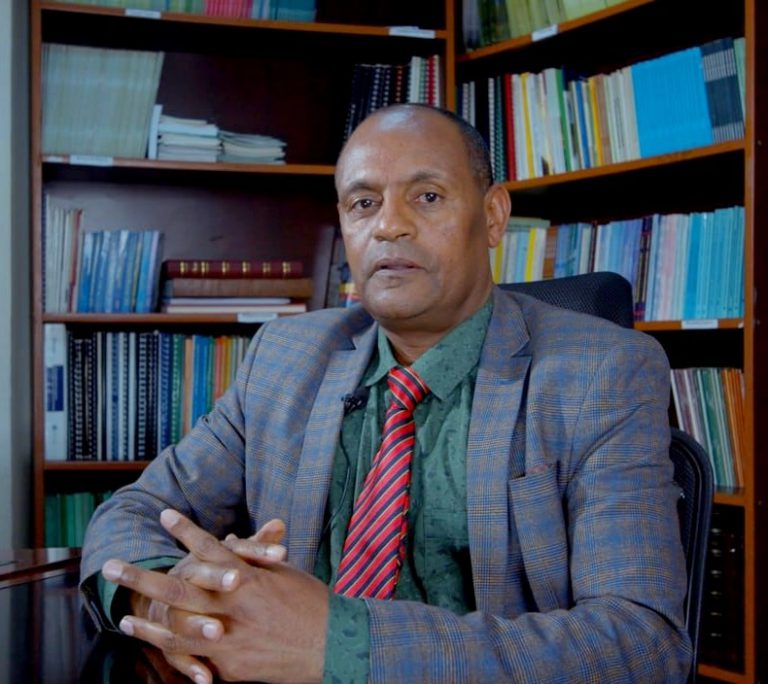
A Message from the Country Director
Dear Reader,
Welcome to the April 2024 edition of the Sasakawa Africa Association (SAA) – Newsletter, focusing on Ethiopia. As we embark on the fourth year of our strategic plan and approach the midpoint of the year, we are delighted to share with you an assortment of articles that highlight the fruits of our dedicated effort, while showcasing valuable insights and developments.
This edition offers diverse write-ups, each showcasing valuable insights and developments. One piece explores the merits of vermiwash, a liquid extract derived from vermicompost, emphasizing its role as a potential bio-pesticide and its alignment with sustainable regenerative farming practices.
Another article delves into the benefits of agro-dealership, highlighting its contributions to youth employment, and the efficient delivery of inputs bundled with extension and advisory services to farmers in remote areas. Additionally, an article on capacity-building discusses the importance of adapting curricula in higher-learning institutions to address evolving development needs.
Meanwhile, we have an article that spotlights the theme of digital extension services, examining the advantages of SAA’s “Ma’ed” Mobile App in delivering timely and updated extension and advisory services to farmers.
This edition also covers the recent field day event on the Policy and Human Resources Development Grant (PHRDG) project, hailed as a remarkable success for providing farmers and stakeholders with invaluable insights into regenerative agriculture practices. Furthermore, we share highlights from the high-level consultative workshop on the Safer and Responsible Use of Pesticides for Human and Environmental Health, which earned great commendation for its focus on a highly relevant and current issue.
Finally, the newsletter covers the notable exhibition of SAA’s technologies at the National Ethiopian Cooperatives Commission’s Exhibition, Bazaar, and Symposium, which generated considerable interest among visitors, and showcased the organization’s impactful contributions.
We hope you find this edition informative and engaging. Your feedback and suggestions are invaluable to us as we strive to continually improve.
Warm Regards,
Fentahun Mengistu
SAA-Ethiopia Country Director
VOICES FROM THE FIELD
VOICES FROM THE FIELD
Farmers Report Positive Results Using Vermiwash to Control Pests and Diseases
Farmers in the Kokit and Taguba Meskel kebeles of Ethiopia’s Meket District are eager to continue using vermiwash, a bio-pesticide, soil fertilizer and plant growth promoter, following evidenced success in the control of diseases and pests, and enhanced output in wheat production.
Vermiwash is a liquid solution produced from the washed-out mucus secretions of vermiworm mixed with dissolved vermicompost exudate. The composition and quality of vermiwash vary depending on the raw organic matter used for the vermicomposting process, but generally include a rich blend of decomposer bacteria, mucus, vitamins, bioavailable minerals, hormones, enzymes, and antimicrobial peptides.
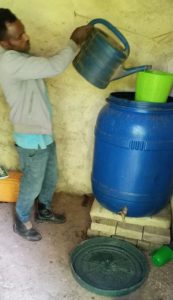 The Sasakawa Africa Association (SAA) has been promoting vermiwash to suppress diseases and insect pests and improve crop productivity due to its biomolecules and microbes, which have fungicidal and pesticidal effects. This has been especially timely in the Meket District, where insect pests like the cutworm and leaf rust affect the production of wheat at the early growth stage. Due to limited availability and high cost of seed dressing agro-chemicals, farmers often use high seed rates to offset the damage.
The Sasakawa Africa Association (SAA) has been promoting vermiwash to suppress diseases and insect pests and improve crop productivity due to its biomolecules and microbes, which have fungicidal and pesticidal effects. This has been especially timely in the Meket District, where insect pests like the cutworm and leaf rust affect the production of wheat at the early growth stage. Due to limited availability and high cost of seed dressing agro-chemicals, farmers often use high seed rates to offset the damage.
For a change, during the 2023 pre-season training, SAA-trained Extension Agents (EAs) and Subject Matter Specialists at Kokit and Taguba Meskel showed farmers how to prepare and apply vermiwash. After the training, the EAs established vermiwash units in their respective Farmer Training Centers (FTCs). The unit was set using a plastic barrel (350-Lts capacity), containing a 40 cm gravel and sand filter layer (20cm gravel; 20cm sand) at the bottom, and a vermiworm layer with decomposable organic materials on top. Five litres of water were sprinkled daily, and after the 17th day, a brown-colored liquid extract was harvested for use. During the season, 150.25 Lts of vermiwash (74.25 Lts in Taguba Meskel and 76 Lts in Kokit) were produced.
The vermiwash was used for wheat as a seed treatment against cutworm, and foliar application to suppress wheat rust. Each host farmer and members of the community-based seed multiplication associations, across both kebeles, received one liter of vermiwash to treat 15Kgs of wheat seed before planting. Both farmers and EAs reported improved crop establishment in treated fields, as compared to untreated ones.
Furthermore, development agents in the Kokit FTC conducted demonstrations on wheat rust control using a rate of 40 litres/ha of vermiwash solution, compared with 0.5 Lts/ha fungicide (Tilt 250 E.C) on the Danphe wheat variety grown on 100 m2 plots. Both plots were sprayed when the crop was at flowering stage following the onset of leaf rust, and both treatments were found to be effective in controlling and suppressing the disease. Farmers commented that untreated fields were severely affected by rust.
This observation indicates that vermiwash is a promising, cost-effective, accessible, and environment-friendly bio-pesticide for regenerative agriculture. Meanwhile, studies on formulation, optimal rate, and efficacy of vermiwash derived from different materials are imperative to scale up the use of the treatment in sustainable agriculture.
VOICES FROM THE FIELD
VOICES FROM THE FIELD
Agro-Dealership Program Boosts Job Prospects for Ethiopian Youth
Youth in the Negele Arsi, Ana Sora, Meket, Angacha, and Kewet Districts of Ethiopia are witnessing a remarkable transformation in their livelihoods thanks to a vision-driven partnership that saw over USD62,000 invested in six agro-dealer groups in just over three years.
The programme began in 2021, when four youth agro-dealer groups, founded by the Sasakawa Africa Association (SAA) were provided with USD 18,231 worth of agricultural inputs like agro-chemicals, personal protective equipment, vegetable seeds, hermetic grain storage bags (PICS), and sprayers, amongst others, as a matching fund from the Crore Program of the Nippon Foundation and Bayer East Africa Ltd.
The groups’ members were further trained on the safe and responsible use of crop protection chemicals, including application techniques, and precautionary and emergency response measures in case of poisoning.
As of 2022, three of these groups had served over 1,060 farmers in the Central Ethiopia and Oromia regions, generating USD 14,308 in annual sales revenues.
Despite encountering challenges along the journey, including inflation and capital constraints affecting several of the groups’ initiatives in the Negele Arsi and Ana Sora woredas. However, their resilience prevailed, attracting further support in the form of additional agricultural inputs valued at USD14,120.
Motivated by the early success in delivering input and extension advisory services to farmers while generating substantial income, SAA expanded the program in 2023, adding two more groups, supported with USD30,085 worth of agricultural inputs. SAA also facilitated connections between agro-dealer groups, wholesalers, and distributors, ensuring reliable access to agricultural inputs.
The initiative continues to boost the access to reliable agricultural inputs and advisory services for smallholder farmers, while creating meaningful job opportunities for young graduates.
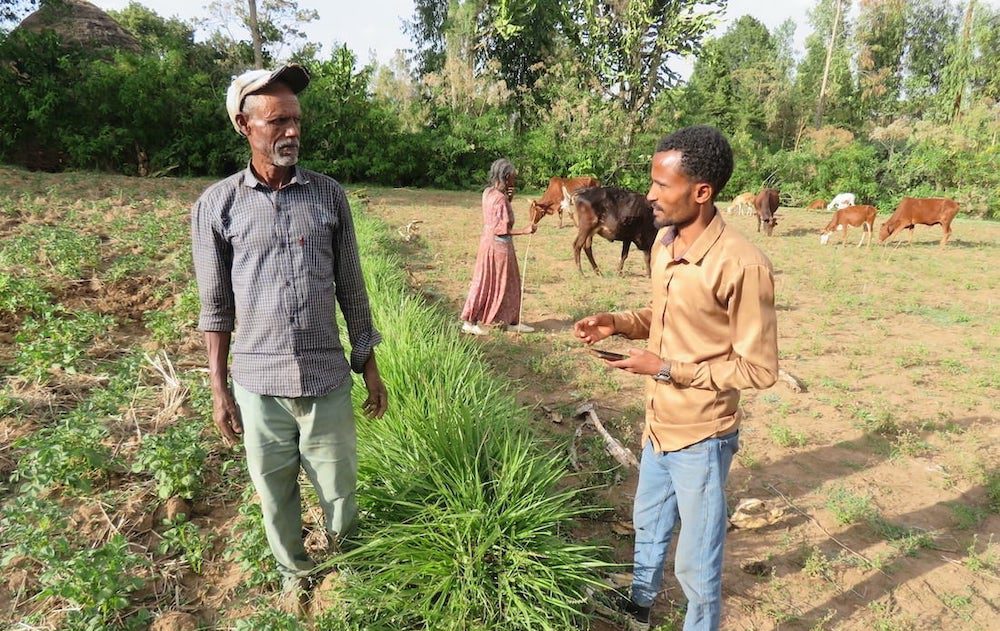
VOICES FROM THE FIELD
VOICES FROM THE FIELD
Farmer Advisory Services Boosted by SAA’s ‘Ma’ed’ App
Thirty-two-year-old frontline Extension Agent (EA) Eyob Mengesha has over the last two years transformed his capacity to deliver agricultural advisory services on the go, thanks to his proficiency with the Ma’ed Farm Suite (MFS). The MFS is a crop-based android mobile app platform that allows EAs to access offline agricultural information and digitized content for the provision of advisory services to smallholder farmers. It was developed in 2022 to complement the Sasakawa Africa Association’s (SAA’s) other digital extension technologies, which include the Amplio Talking Book and the Digital Classroom System (DCS).
Mengesha, who has a master’s degree, was among the earliest EAs to receive training on the MFS offered through the SAA’s Digital Agricultural Extension and Advisory Services (DAEAS) program. He has, so far, successfully advised 150 smallholder farmers (17% women) supported by the MFS, further affirming the defining position of digital innovations in improving the quality, timeliness, inclusiveness of services provided to smallholder farmers.
“The training and subsequent access to agricultural information has enabled me to harness offline resources on topics such as regenerative agriculture and post-harvest technologies using MFS. This access has significantly improved my ability to provide farmers with up-to-date extension and advisory services,” he said.
He further observed an interest among young farmers to learn more about the MFS app, with the demonstrated potential of its use as a tool to enhance their farming businesses.
“However, for the app to be used more effectively, SAA should provide additional resources and access to tools, covering areas like crop-livestock integration, horticulture, permaculture, nutrition, and animal production, amongst other topics,” he noted.
Meanwhile, the advent of the MFS remains in alignment with the Ethiopian government’s Digital Ethiopia 2025 strategy, which prioritizes the agricultural sector for achieving inclusive prosperity. It also aligns with the Ministry of Agriculture’s DAEAS Roadmap 2030, and the Digital Agriculture Roadmap (DAR).
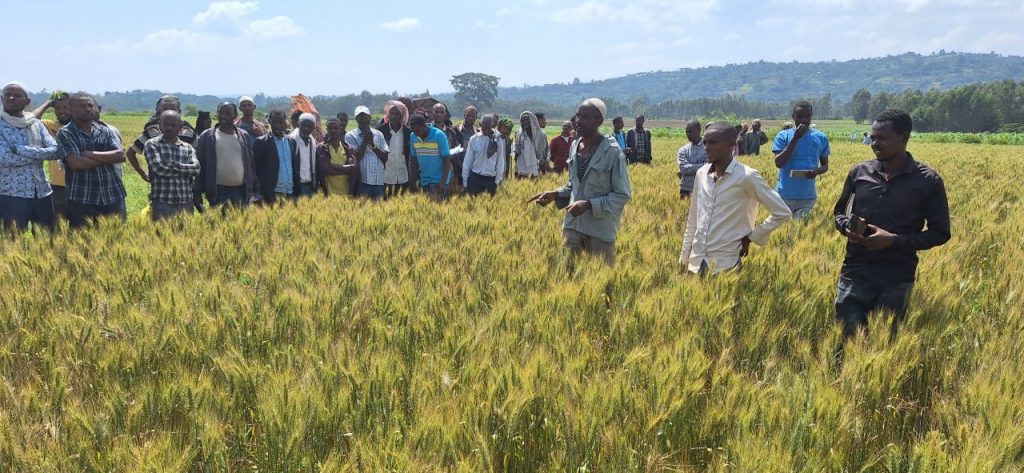
ACTIVITIES
ACTIVITIES
Jimma Farmers Experience First-hand the Transformative Power of Regenerative Agriculture
On March 19, 2024, over 170 farmers (30% women), along with Extension Agents (EAs), researchers, and stakeholders from the Shashemene kebele of the Seka Chekorsa District in Ethiopia’s Jimma Zone, attended a field day showcasing the benefits of regenerative agriculture (RA) practices in wheat production.
The event was part of the Evidence-based Regenerative Agriculture (EbRACCA) project, funded by Japan’s Policy and Human Resources Development Grant (PHRDG), through the African Development Bank (AfDB). Across the day, farmers were trained on the implementation of RA technologies, including the use of the high-yielding, early-maturing, and heat-tolerant wheat variety Deka, along with vermi-compost, inorganic fertilizers, and lime to address acidic soils. Observations revealed that plots using RA practices had better crop performance compared to conventional methods.
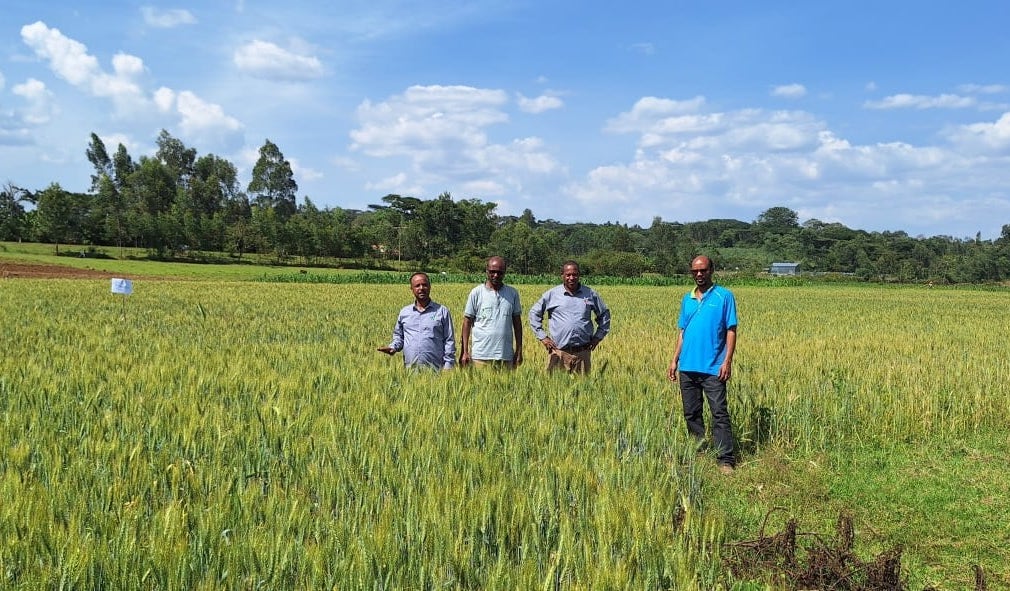
Farmers acknowledged the efficacy of lime in soil treatment, noting its impactful combination with vermi-compost in enhancing soil fertility and crop performance. Ms. Rehima Gali, the Deputy Head of the Zonal Department of Agriculture, emphasized the importance of RA interventions in addressing acidic soils prevalent in the Jimma zone, where 47% of cultivated land has a pH below 5.5. She encouraged farmers to adopt and scale RA practices, while addressing concerns about resource availability and technical support raised by farmers. Together with Mr. Mustefa Nuredin, the District Agriculture Office Head, she pledged to facilitate access to lime and vermicompost and provide technical assistance.
The establishment of a vermi-center in the kebele was proposed to support farmers in producing vermi-compost with the help of Extension Agents (EAs), further enhancing RA adoption and scalability.
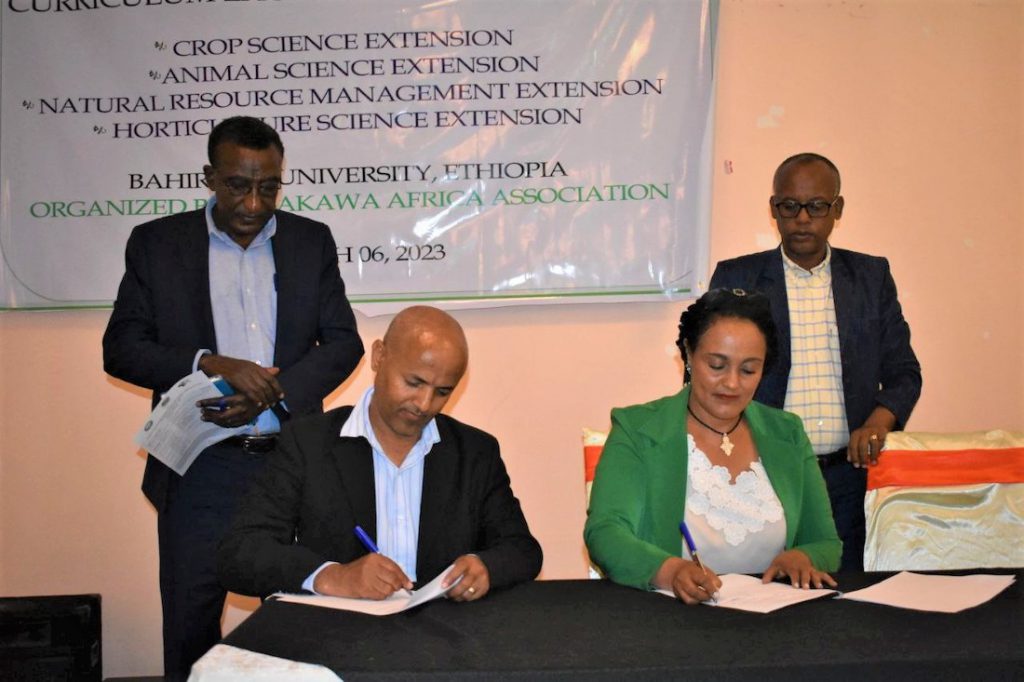
ACTIVITIES
ACTIVITIES
Universities Introduce New Extension Curricula Developed by SAA and BDU
The implementation of new curricula for Crop Extension, Livestock Extension, Natural Resource Extension, and Horticulture Extension has taken off rapidly with 160 students (50% female) already enrolled for a training programme by the Bahir Dar University (BDU) covering the four extension streams. More admissions are ongoing at the Wollo University, where the revamped curricula have been adopted.
The revised curricula were developed in 2023 as a collaboration between the Sasakawa Africa Association (SAA) and BDU to align extension training with the current demands of the agricultural sector. This followed revelation by the Amhara Bureau of Agriculture (BoA) indicating a presence of over 11,000 Diploma-holder Extension Agents (EAs) in the region, sparking a call for upgrading them to degree-level education.
SAA and BDU’s revised curricula were rigorously reviewed and endorsed by both the university and employers, marking a significant shift away from a focus on extension and communication, towards comprehensive courses covering the effective management of natural resources, livestock, and crops. The new curricula were launched on March 6, 2023, in the presence of 60 delegates from the BoA, the Civil Service Commission, as well as the Bahir Dar, Gondar, and Wollo Universities. It was at the same event that SAA facilitated the signing of a Memorandum of Understanding (MoU) between the BoA and BDU to train EAs in the four extension streams.
EVENTS
EVENTS
Ethiopia’s Agriculture Stakeholders Meet to Address Pesticide Concerns
On February 12th, 2024, the Sasakawa Africa Association (SAA), in collaboration with the Ministry of Agriculture (MoA), Ethiopian Agriculture Authority (EAA), and Bayer East Africa Limited, organized a high-level consultative workshop to discuss the gaps, challenges, risks, and regulatory frameworks related to pesticide use, and to outline strategies for their safe and responsible use.
The workshop was attended by 98 participants, including high-level government officials like the MoA’s State Minister, Hon. Efa Muleta, and EAA Director General, Ambassador Driba Kuma, alongside representatives from diverse institutions.
Six papers were presented by the MoA, EAA, Ethiopian Institute of Agricultural Research (EIAR), CropLife Ethiopia, and the Pesticide Action Nexus Association-Ethiopia, addressing the multiple challenges associated with pesticide import, formulation, regulation, trade, use, and disposal. A notable concern was the widespread lack of knowledge and skills in pesticide safety, including its proper use and handling throughout the agricultural value chain.
At the end of the workshop, the following key recommendations were made:
- Enhanced collaboration between the MoA, Ministry of Health, Environmental Protection Authority, and other relevant agencies to ensure proper pesticide handling and management across the agricultural value chain.
- Development of an extension package on the safe use of agrochemicals.
- Mobilization of resources for sectorial infrastructure development.
- Validation and endorsement of the agrochemical policy developed by the Ethiopian Policy Development Institute.
- Tax exemption for the importation of Personal Protection Equipment (PPE).
- Establishment of mini laboratories for the detection of substandard and illegal products, with at least one referral laboratory to verify agrochemical quality; and
- Regular meetings between stakeholders to keep the momentum of inter-institutional cooperation and effective implementation of the recommended measures.
EVENTS
Ethiopia’s Agriculture Stakeholders Meet to Address Pesticide Concerns
On February 12th, 2024, the Sasakawa Africa Association (SAA), in collaboration with the Ministry of Agriculture (MoA), Ethiopian Agriculture Authority (EAA), and Bayer East Africa Limited, organized a high-level consultative workshop to discuss the gaps, challenges, risks, and regulatory frameworks related to pesticide use, and to outline strategies for their safe and responsible use.
The workshop was attended by 98 participants, including high-level government officials like the MoA’s State Minister, Hon. Efa Muleta, and EAA Director General, Ambassador Driba Kuma, alongside representatives from diverse institutions.
Six papers were presented by the MoA, EAA, Ethiopian Institute of Agricultural Research (EIAR), CropLife Ethiopia, and the Pesticide Action Nexus Association-Ethiopia, addressing the multiple challenges associated with pesticide import, formulation, regulation, trade, use, and disposal. A notable concern was the widespread lack of knowledge and skills in pesticide safety, including its proper use and handling throughout the agricultural value chain.
At the end of the workshop, the following key recommendations were made:
- Enhanced collaboration between the MoA, Ministry of Health, Environmental Protection Authority, and other relevant agencies to ensure proper pesticide handling and management across the agricultural value chain.
- Development of an extension package on the safe use of agrochemicals.
- Mobilization of resources for sectorial infrastructure development.
- Validation and endorsement of the agrochemical policy developed by the Ethiopian Policy Development Institute.
- Tax exemption for the importation of Personal Protection Equipment (PPE).
- Establishment of mini laboratories for the detection of substandard and illegal products, with at least one referral laboratory to verify agrochemical quality; and
- Regular meetings between stakeholders to keep the momentum of inter-institutional cooperation and effective implementation of the recommended measures.
EVENTS
SAA-Ethiopia Stands out at Exhibition, Bazaar and Symposium of Cooperatives
As a key partner of the Ethiopian Cooperatives Commission (ECC), the Sasakawa Africa Association (SAA) took part in the 10th National and 3rd Addis Ababa City Exhibition, Bazaar and Symposium of Cooperatives held at the Addis Ababa Exhibition Center from February 8-13, 2024. The annual event provided a platform for SAA to showcase its innovations, to network with partners, and to exchange best practices in the pursuit of common goals for food security and cooperative business development.
The 2024 edition was inaugurated by Her Worship Mrs. Adanech Abebe, the Mayor of Addis Ababa City, and other dignitaries, including Hon. Dr. Girma Amente, Ethiopia’s Minister for Agriculture. SAA showcased its contributions to sustainable farming, postharvest interventions, agro-processing, nutrition, agribusiness development, and digital extension, through prototypes, posters, printed materials, giveaways, and flyers.
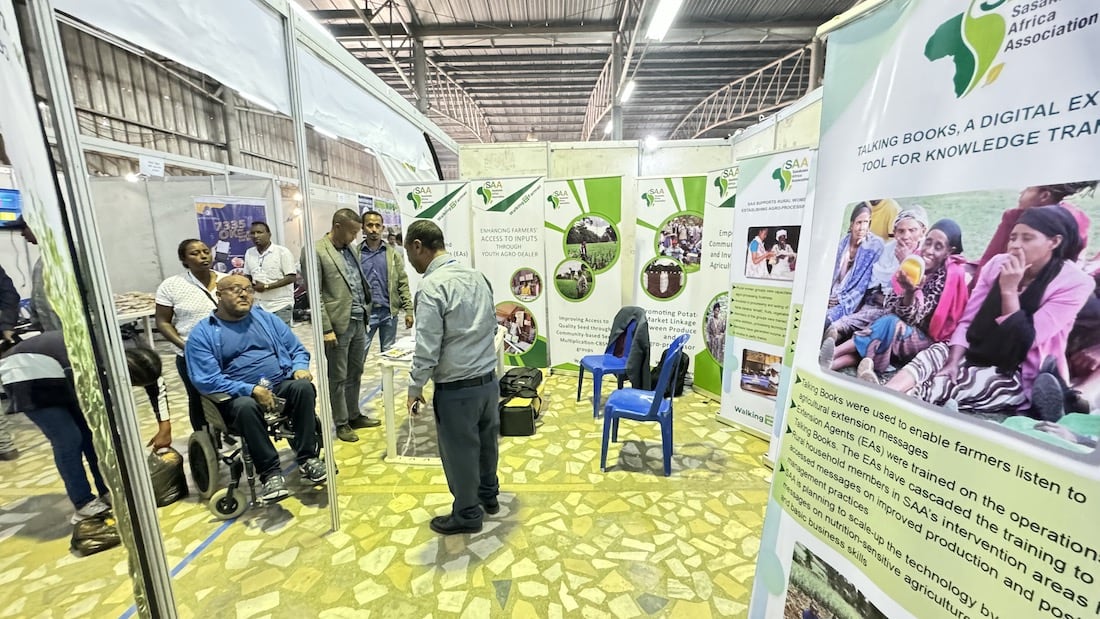
Over 250 visitors passed through the SAA booth, expressing an interest in understanding the organization’s role in agriculture development. Many visitors recommended a reduction of the overreliance on inorganic fertilization and focusing on regenerative agriculture, scaling up best practices, and expanding SAA’s reach to more regions. Further requests were made for collaboration with SAA in technology promotion.
Additionally, the exhibition provided an opportunity for SAA to facilitate business linkages in the Potato Value chain. For instance, Mr. Solomon Girma a resident of Arsi Eteya, was introduced to a potato seed grower in the Holeta area seeking 20,000 Kg of high-quality potato seed. He was also connected with the Dessie Tissue Culture Laboratory for future seed prediction, and the Loli chips factory for potential supply opportunities in the upcoming harvest season.
EVENTS
SAA-Ethiopia Stands out at Exhibition, Bazaar and Symposium of Cooperatives
As a key partner of the Ethiopian Cooperatives Commission (ECC), the Sasakawa Africa Association (SAA) took part in the 10th National and 3rd Addis Ababa City Exhibition, Bazaar and Symposium of Cooperatives held at the Addis Ababa Exhibition Center from February 8-13, 2024. The annual event provided a platform for SAA to showcase its innovations, to network with partners, and to exchange best practices in the pursuit of common goals for food security and cooperative business development.
The 2024 edition was inaugurated by Her Worship Mrs. Adanech Abebe, the Mayor of Addis Ababa City, and other dignitaries, including Hon. Dr. Girma Amente, Ethiopia’s Minister for Agriculture. SAA showcased its contributions to sustainable farming, postharvest interventions, agro-processing, nutrition, agribusiness development, and digital extension, through prototypes, posters, printed materials, giveaways, and flyers.

Over 250 visitors passed through the SAA booth, expressing an interest in understanding the organization’s role in agriculture development. Many visitors recommended a reduction of the overreliance on inorganic fertilization and focusing on regenerative agriculture, scaling up best practices, and expanding SAA’s reach to more regions. Further requests were made for collaboration with SAA in technology promotion.
Additionally, the exhibition provided an opportunity for SAA to facilitate business linkages in the Potato Value chain. For instance, Mr. Solomon Girma a resident of Arsi Eteya, was introduced to a potato seed grower in the Holeta area seeking 20,000 Kg of high-quality potato seed. He was also connected with the Dessie Tissue Culture Laboratory for future seed prediction, and the Loli chips factory for potential supply opportunities in the upcoming harvest season.
NEWS & EVENTS FROM OTHER SAA COUNTRIES
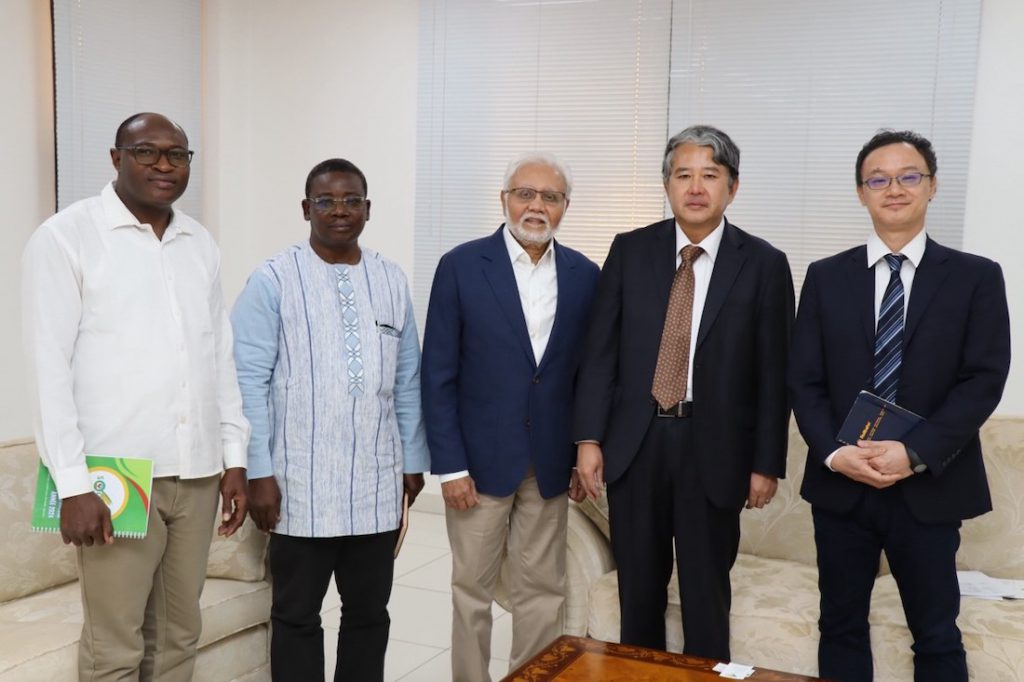
NEWS
NEWS
SAA Leadership in Strengthening Partnerships Affirmed During Chair’s Trip to Mali
During his recent visit to Mali, Dr. Amit Roy, the Chair of the Sasakawa Africa Association (SAA), extensively engaged in a series of meetings aimed at strengthening strategic partnerships and cooperation to advance agricultural development initiatives. These meetings, involving key global and national partners, underscored SAA’s commitment to improving food security and promoting sustainable agricultural practices in Mali and beyond.
A pivotal discussion unfolded with the Honorable Mr. Lassine Dembele, Mali’s Minister for Agriculture, and the Mr. Souleymane Yacoube, Director of Extension. Initially scheduled for half an hour, the meeting extended to 90 minutes, demonstrating the minister’s deep understanding and appreciation of SAA’s contributions. Hon. Dembele emphasized the urgency of accelerating and enhancing SAA’s initiatives to broaden their impact, underscoring the need for increased resource allocation.
In a meeting with H.E. the Japanese Ambassador to Mali, Mr. Uezono Hideki, Dr. Roy discussed the progress and management of infrastructure projects funded by Japan. Ambassador Hideki expressed a keen interest in these initiatives, emphasizing the importance of regular updates and transparent management to ensure the success and scalability of such projects.
Similarly, Dr. Roy’s discussion with the First Secretary Ms. Astrid Mastenbroek at the Embassy of the Kingdom of the Netherlands provided valuable insight into the embassy’s funding approach, which prioritizes local proposals that promise impactful and relevant implementation. This method underscores the importance of local engagement in international development projects.
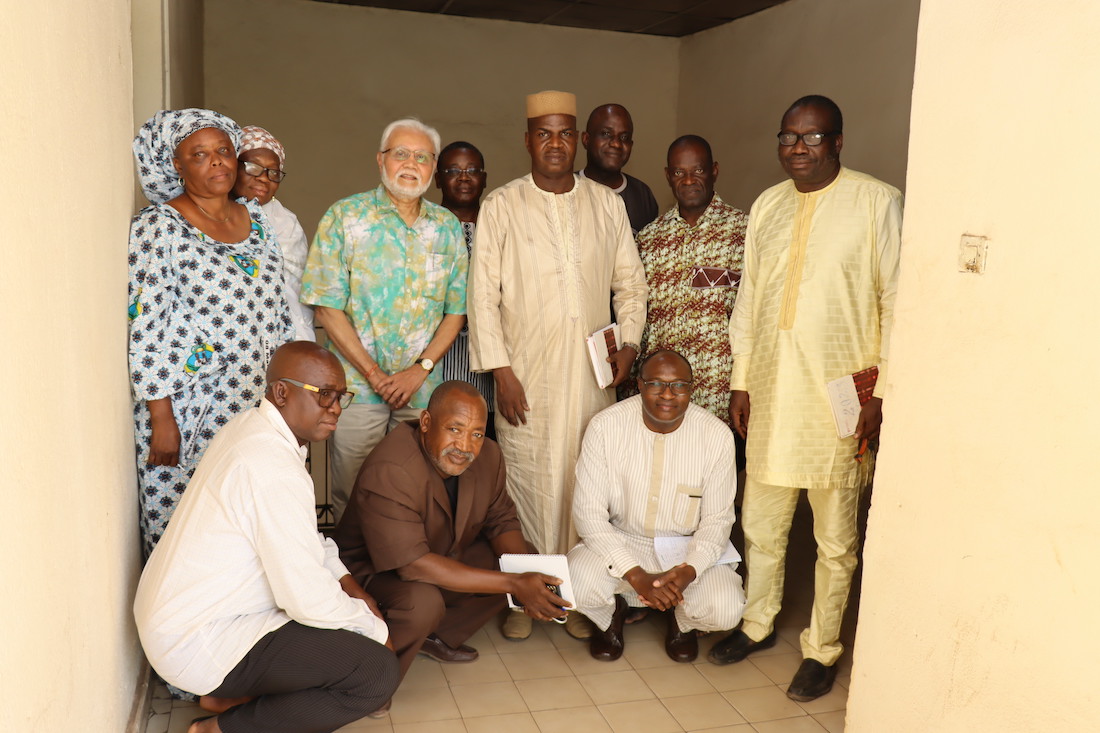
In another productive meeting, USAID affirmed the value of SAA’s work and its alignment with USAID’s policy in supporting local entities over international NGOs. This policy aims to build local capacities, ensuring sustainable development and long-term benefits. Dr. Roy was encouraged by USAID’s proactive communication regarding upcoming funding opportunities, reflecting a deep commitment to collaborative development efforts.
During his stay, Dr. Roy also visited the Samanko Postharvest Training Center (PHTC), where facilities supported by the Japanese Ministry of Foreign Affairs are currently undergoing improvement. Despite the visit happening over Ramadan, over 200 people, mostly women, attended, demonstrating strong community engagement and support. The center’s leaders expressed pride and gratitude for the new facilities, which include a 50-tonne warehouse, training center, storage tank, solar panels, and two tractors, items that significantly enhance the center’s capabilities.
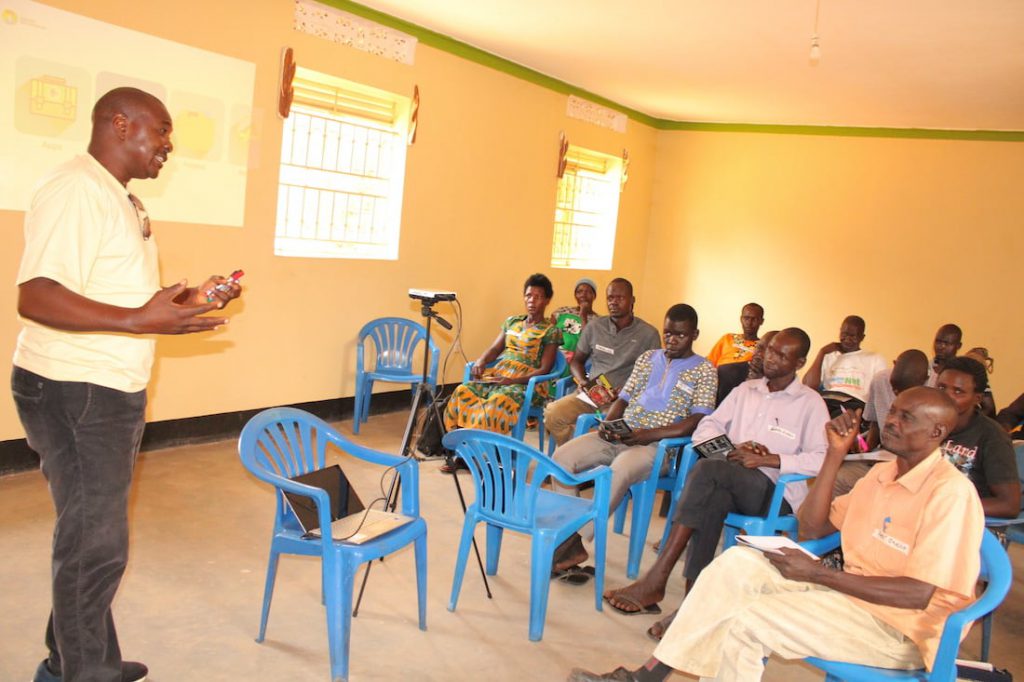
NEWS
NEWS
Rural Community Leaders in Uganda Empowered Through Financial Training in Uganda
Sixty-eight individuals, including Extension Agents (EAs) and farmer group leaders from Uganda’s Mubende, Kiboga, Otuke, and Kole districts, were in February 2024 empowered with the skills needed to optimize agribusiness investments and effectively manage group savings. The training, conducted by the Sasakawa Africa Association (SAA), was based on the Community Savings and Investment in Agriculture (CSIA) model. The CSIA is a grassroots initiative designed to alleviate poverty by providing financial and social empowerment opportunities and investment avenues to economically marginalized individuals. It promotes a culture of saving and investment to address immediate financial needs while laying the groundwork for long-term, sustainable economic development.
The training involved various tactics including brainstorming, group work, and visual aids like the CSIA Handbook and CSIA Manual, to give participants a deep understanding of key financial concepts and principles.
These sessions emphasized the importance of providing accessible, member-owned financial support tailored to immediate needs, as well as strategies for fostering and expanding investments. It is worth noting that SAA has been leveraging the CSIA approach since 2020, reinforcing its ongoing efforts to drive agricultural development.
During the February training, facilitated by Mr. Ande Okiror, the SAA Program Coordinator for Market Oriented Agriculture, participants identified challenges hindering their savings drive, such as limited income and rising living costs. Mr. Okiror provided practical solutions, including budgeting techniques and the establishment of emergency funds.
By the end of the training, the participants were prepared to serve as community resource persons on the CSIA methodology, equipped with action plans in place for collaboration with financial institutions to facilitate access to finance.
Further step-down training will be conducted by Commodity Association Traders/Trainers (CATs), Extension Workers, and Community-Based Facilitators, ensuring the sustainability and scalability of our efforts.
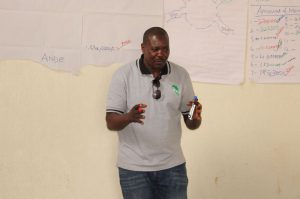
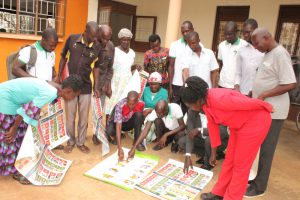
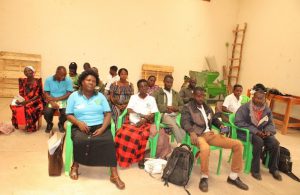
For, full story,
https://www.saa-safe.org/news/news.php?nt=2&vid=576&lng=usa
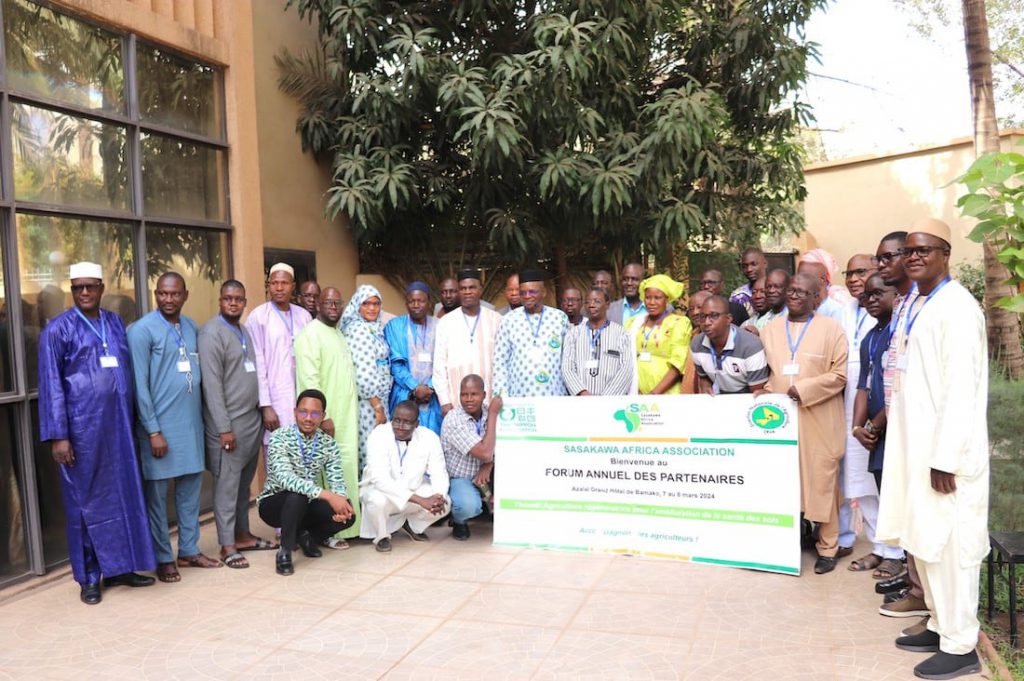
NEWS
NEWS
Regenerative Agriculture takes Center Stage at Annual Stakeholders’ Forum in Mali
For two days (March 7 – 8, 2024), the Sasakawa Africa Association – Mali (SAA-Mali) office held its Annual Stakeholders’ Forum at the Azalaï Grand Hotel in the country’s capital, Bamako. Convened under the theme “Regenerative Agriculture for Improving Soil Health”, the gathering shone the spotlight on the sustainable agricultural practices that enhance soil health.
On the first day, leaders of agricultural cooperatives and their advisory teams reflected on the previous year’s activities, drawing valuable lessons and charting future strategies. Cooperative leaders found these sessions highly beneficial, advocating for more frequent gatherings to foster ongoing development and resilience in competitive farming environments.
The following day broadened the dialogue, welcoming government representatives, academic institutions such as the University of Ségou and IPR-IFRA of Katibougou, and various NGOs. SAA Mali’s Country Director, Dr. Tapsoba Hamado, underscored the relevance of this year’s theme within the context of sustainable development and climate resilience. Mr. Oumar Tamboura, the General Secretary of the Ministry of Agriculture endorsed the theme, noting its alignment with national policies aimed at enhancing soil health and food security.
Interactive sessions, led by Dr. Stella Kabiri, the Regenerative Agriculture Lead at SAA, featured dynamic question and answer sessions, and engaging activities spotlighting regenerative technologies and crop strategies suitable for Mali’s changing climate. These discussions aimed to explore and promote cropping models that maintain year-round soil cover, enhancing biodiversity and mitigating climate change effects.
The forum concluded on a positive note, highlighting the significant benefits of regenerative agriculture technologies and practices to Mali’s smallholder farmers. Insights and recommendations are expected to steer the progress of sustainable farming practices in the region, ultimately improving the outcomes for local farmers and the agricultural landscape.
For full story,
https://www.saa-safe.org/news/news.php?nt=1&vid=572&lng=usa
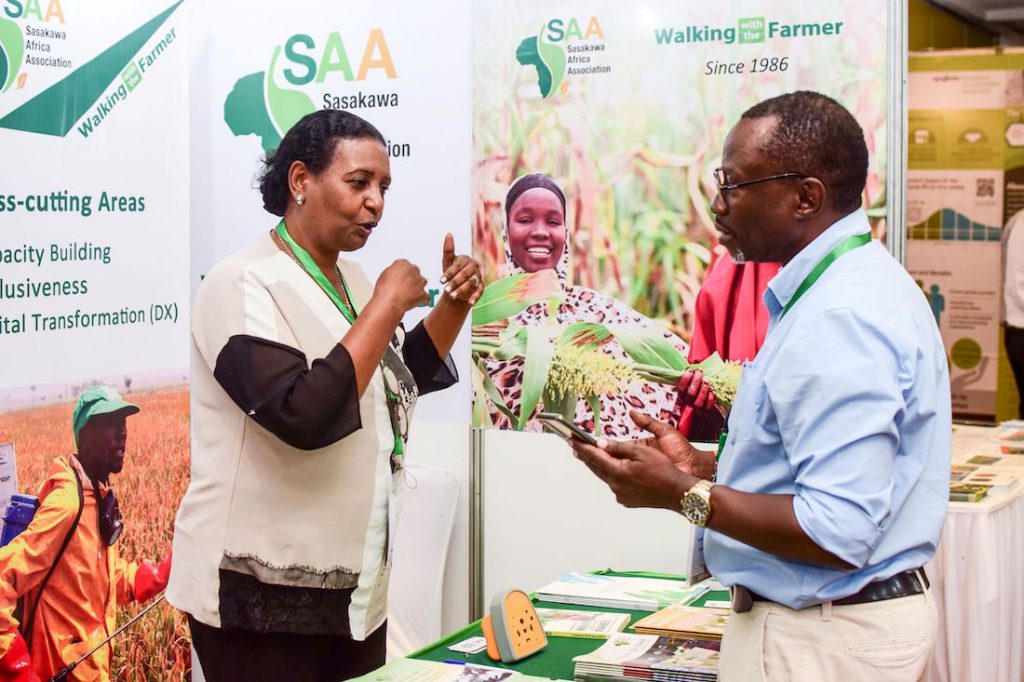
NEWS
NEWS
SAA Showcases its Interventions for Sustainable Agriculture at AFSTA Congress 2024
The Sasakawa Africa Association was actively present at the 24th African Seed Trade Association (AFSTA) Annual Congress, in Mombasa, Kenya, where its exhibition attracted numerous visitors, including Honorable Mithika Linturi, Kenya’s Cabinet Secretary for Agriculture and Livestock Development.
This interaction provided a platform for productive discussions around potential partnerships aimed at enhancing the access to quality seeds in Africa. The AFSTA, of which the Sasakawa Africa Association (SAA) is a member, firmly recognizes that the economic progress of African countries relies on the establishment of a robust seed sector. It also advocates for the integration of modern technologies in agricultural processes to achieve this objective. Its annual congress holds great significance within the agricultural sector calendar owing to its specific focus on seed trade.
This year’s convening attracted 300 delegates representing seed traders, producers, and partners from various regions of the world. The congress featured presentations, panel discussions, and networking opportunities, enabling participants to exchange knowledge, showcase new technologies, and foster collaborations to advance the seed industry and improve the agricultural prospects of the continent.
SAA was represented by Ms. Yalemzewed Teshome, the Market Oriented Agriculture Coordinator at SAA-Ethiopia, and Ms. Ethiopia Tadesse, SAA’s Head of Communication and Advocacy.
For full story,
https://www.saa-safe.org/news/news.php?nt=1&vid=573&lng=usa

NEWS
NEWS
Sasakawa Africa Association Conducted Pre-Season ToT in Nigeria
In a collaborative effort to strengthen food security across Nigeria, the Sasakawa Africa Association (SAA) has conducted its 2024 pre-season training program for extension agents. This initiative equipped 90 frontline agents from Kano, Jigawa, Gombe, Nasarawa, Benue, and Kwara states with the necessary expertise to empower local farmers during the upcoming planting season.
The training emphasized improved agronomic practices and establishing 360 farmer learning platforms to promote sustainable farming methods and knowledge sharing among farmers.
Following the training, these agents are expected to work directly with their respective state’s Agricultural Development Program (ADP) to cascade the acquired knowledge and skills to farmers within their designated clusters to ensure a wider project reach, ultimately empowering more farmers and contributing to a more sustainable food system for Nigeria.
